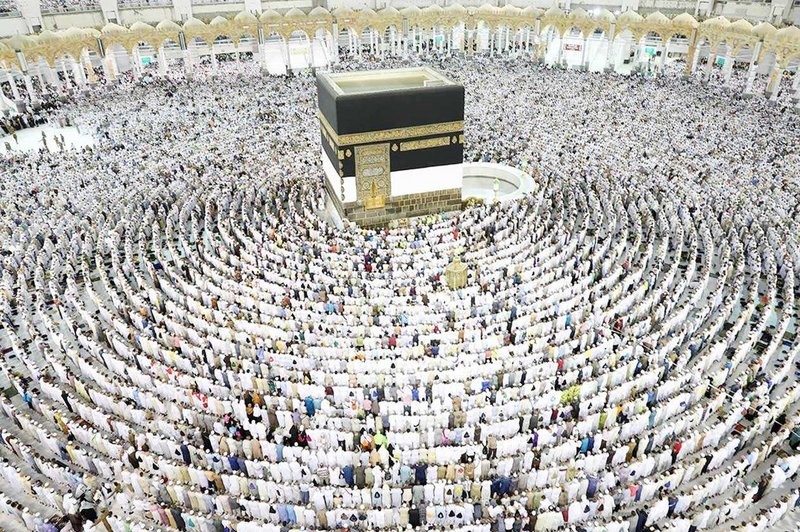Towards Meeting the Almighty – Part 7

How to Achieve a Sense of Expectation Regarding Meeting God in the Hereafter
Understanding the Concept Accurately
إِنَّ الَّذِينَ لَا يَرْجُونَ لِقَاءَنَا وَرَضُوا بِالْحَيَاةِ الدُّنْيَا وَاطْمَأَنُّوا بِهَا وَالَّذِينَ هُمْ عَنْ آيَاتِنَا غَافِلُونَ أُولَٰئِكَ مَأْوَاهُمُ النَّارُ بِمَا كَانُوا يَكْسِبُونَ
“Indeed those who do not expect to encounter Us and who are pleased with the life of this world and satisfied with it, and those who are oblivious of Our signs. It is they whose refuge shall be the Fire because of what they used to earn.”[1]
The Holy Quran reprimands those who bear no expectation with respect to the divine audience that inevitably awaits them in the Afterlife. However, in order for someone to achieve such expectation and hope, they must first attain a clear and lucid understanding of what this expectation relates to. This means that they must develop a proper comprehension of what “meeting the Almighty” truly entails and whether any such eventuality can be deemed possible or not.
Common Misconceptions
Many people find themselves stuck at this very juncture. Due to a lack of knowledge or weak intellectual skills, certain thinkers have not been able to fathom the actual nature of “meeting the Almighty”. As a result, these individuals argued that the Quranic verses in question need to be interpreted in a more metaphorical sense. In their view, when the Holy Quran talks about “meeting God”, it does not mean that people will actually and literally be in the Almighty’s divine presence. Instead, what it essentially seeks to convey is that human beings will find themselves face to face with God’s mercy or His divine judgment and retribution. So, according to this particular standpoint, the Quranic verses under review have omitted certain words simply because the idea was apparently all too clear for everyone to understand. Other scholars have also argued that if the idea of “meeting God” were to be taken literally, then such an understanding would necessitate a physical existence for the Almighty. This, in turn, is impossible and therefore we must interpret the Quranic verses in question in a manner that avoids any such conjecture about God.
Our Fundamental Limitations and How We Can Perceive God and His Company
Admittedly, no soul can ever truly perceive the essence of God’s divine entity, nor can anyone accurately grasp the depth and reality of His deific traits and characteristics. In fact, we cannot even begin to properly have cognizance and appreciate the actuality of the Almighty’s actions. Even the great prophet Ibrāhīm (as) found himself in reverent bewilderment by the utter miraculousness of Allah’s deeds and so he requested the Creator to show him how He bestows life upon His creations. Indeed, the only way through which we may hope to achieve a mere glimmer of understanding about the Almighty’s divine works is to meticulously study the manifest effects and impacts of His deific actions.
Having said that, we humans are fully capable of forming an abstract concept of God, even though His true being and essence lie far beyond the possibility of percipience. In the very same way, we can also form an abstract idea of what “meeting the Almighty” means. Without being impeded by the fact that we cannot conceive an accurate picture of what any such heavenly encounter may entail, we can nevertheless superficially imagine an audience with the Divine wherein there exists no obstacle or barrier between us and the Almighty. This is similar to how we regularly visualize things like the ocean or the universe without being capable of existentially encompassing them in any way or form.
What Await Those Who Deem It Impossible to Meet the Almighty?
The Quranic verse quoted earlier says that those who do not expect to meet their Lord and Creator on the Day of Judgement shall be punished with Hellfire. Does this verdict include those who believe in the Hereafter, and in Divine Judgement, but lack such an expectation simply because they believe that a literal meeting with the Almighty is impossible? Surely not, for how can the excruciating torments of Hellfire, created specifically for those who adamantly deny the truth and existence of the Hereafter, be deemed applicable for such individuals.
Nevertheless, a different kind of loss silently lies in waiting for people of such conviction. In order to comprehend this, we must first revisit the idea that “meeting God” will not be the same for all human beings. As we have explained earlier in quite some detail, there will exist at least two different levels to such a meeting: a universal encounter with the Divine, and a special audience reserved only for the Almighty’s most pious and devoted servants. Now, imagine yourself in the Hereafter. All veils have been drawn apart and you find yourself, alongside billions of others, in the Almighty’s divine presence during mankind’s universal gathering before its Creator. No longer does any doubt linger within your mind about the possibility of such an event. Now, imagine the sheer pain and agony of being a steadfast believer but, nevertheless, being denied a special audience with God. This anguish may not be Hellfire itself, but it will surely blister the soul just as ruthlessly. The Commander of the Faithful (a) speaks of this torment most eloquently within the “Supplications of Kumayl”.
“O’ God, O’ Lord, O’ Master! Even if I were to patiently bear the torture of Your Hellfire, how could I ever tolerate the agony of being away from Your divine presence.”[2]
In order to get a mere taste of the kind of pain and joy being discussed here, imagine a mother losing her child within a crowd. Imagine the crushing anxiety and harrowing fear experienced by her heart as she frantically searches for her baby. In those few moments, she dies a hundred times over. Now, imagine her finally finding her youngster. Imagine her euphoric joy and the enrapturing relief that engulfs her soul. Indeed, being cleaved away from your loved ones causes such unbearable pain, while meeting them or being in their presence gives us inexplicable joy. These two emotions reach their very pinnacle when our “beloved” is none other than God Almighty.
How We Fall in Love
When we humans perceive someone to be endowed with some sort of excellence, and we focus ourselves upon that particular facet of their being, we end up falling in love with them. Therefore, love is a consequence of perceived excellence within one’s beloved. The perfection of God’s entity is infinite and boundless, without any limitation nor any shadow of deficiency. As such, human minds can only fathom a miniscule fraction of His divine merits and plenitude. However, if a soul were to rise to the utmost levels of spiritual advancement, it would begin to realize and understand God’s true and foremost excellence. This deep and existential comprehension would, in turn, lead to a level of love that is truly unimaginable. Indeed, the most excellent of God’s creations are but a mere drop when compared to the vast and limitless ocean of His own unparalleled perfection and excellence. In fact, there is no comparison possible, for how can essentially limited traits or entities be compared to the infinite perfection of His being and attributes. Consequently, if our entire existence, and every iota of our souls and bodies, were to fall madly in love with God, such love would still not be enough to express proper tribute to Him.
The Folly of Those Who Deem It Impossible to Meet God or Simply Do Not Wish to Meet Him
As mentioned before, it is possible for human beings to attain a right of passage into the Almighty’s special audience with His most devoted and sincere servants. If such an eventuality was not possible, then God’s chosen and immaculate saints such as Imam Zayn al-Ābidīn (a) would not have yearned and supplicated for it. However, if a person were to deem any such meeting to be impossible, believing all mention of it to be mere metaphorical and allegorical expression, then such an individual will naturally never strive in order to achieve a place in the aforementioned divine audience. As a result, this person will automatically deprive him or herself of the supreme pleasure of that unique event, while simultaneously condemning their own souls to the suffering brought about as a consequence of separation from the Almighty’s close company.
On the other hand, there may also exist people who believe such a meeting to be possible but, nevertheless, have no wish to be a part of the said event. This is because their hearts are prisoners to other longings and desires. We find such phenomena within worldly and material connections as well. Sometimes individuals are so attached to a particular object that they totally ignore things that are far better and superior to the object of their own infatuation. When a heart falls captive to these superficial and worldly entrapments, especially those that are in stark contradiction to God’s will and commandments, then such a heart becomes oblivious to God’s love and loses the very right to deserve any special relationship with the Divine. However, if a heart were free itself of any such entanglements, and if it strived to rise towards God, then the Almighty would surely embrace it with His limitless mercy and compassion.
Everything and Every Moment for God Almighty
According to narrated traditions, there exist within Paradise various manifestations of God’s glorious illumination visible only to His most pious and devoted servants. When these illuminations reveal themselves, the people of Paradise are so utterly and totally absorbed by their majesty and beauty that they forget and ignore everything else. Such is the infinite pleasure of His vision. If a person wishes to attain such a status and position within the afterlife, then he or she must devote themselves completely to God’s will. All their works and deeds should be for the Almighty’s pleasure. Their words, interactions, actions and reactions must all be vessels designed to fulfill their divinely ordained responsibilities and to win God’s volition and affection.
If an individual is able to discipline him or herself in this manner, then the Almighty’s mercy and benevolence will allow him or her to transform completely. Through His will, the individual in question will find that their entire existence has become godly and pure. They will find their hearts emancipated of worldly obsessions and desires, and utterly saturated with God’s love and devotion.
In contrast, if a heart voluntarily continues to remain polluted with the lusts and longings of this temporal world, then such a heart has no place for God.
[1] The Holy Quran, Surah Yūnus, verse 7-8
[2] Bihār al-Anwār, vol. 67, pg. 196; Mifātīḥ al-Jinān, Du’ā al-Kumayl


